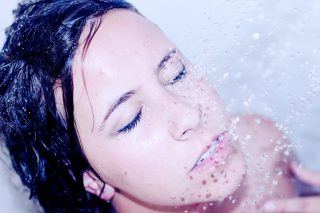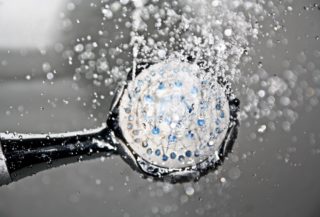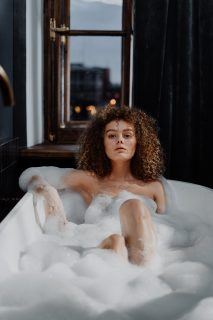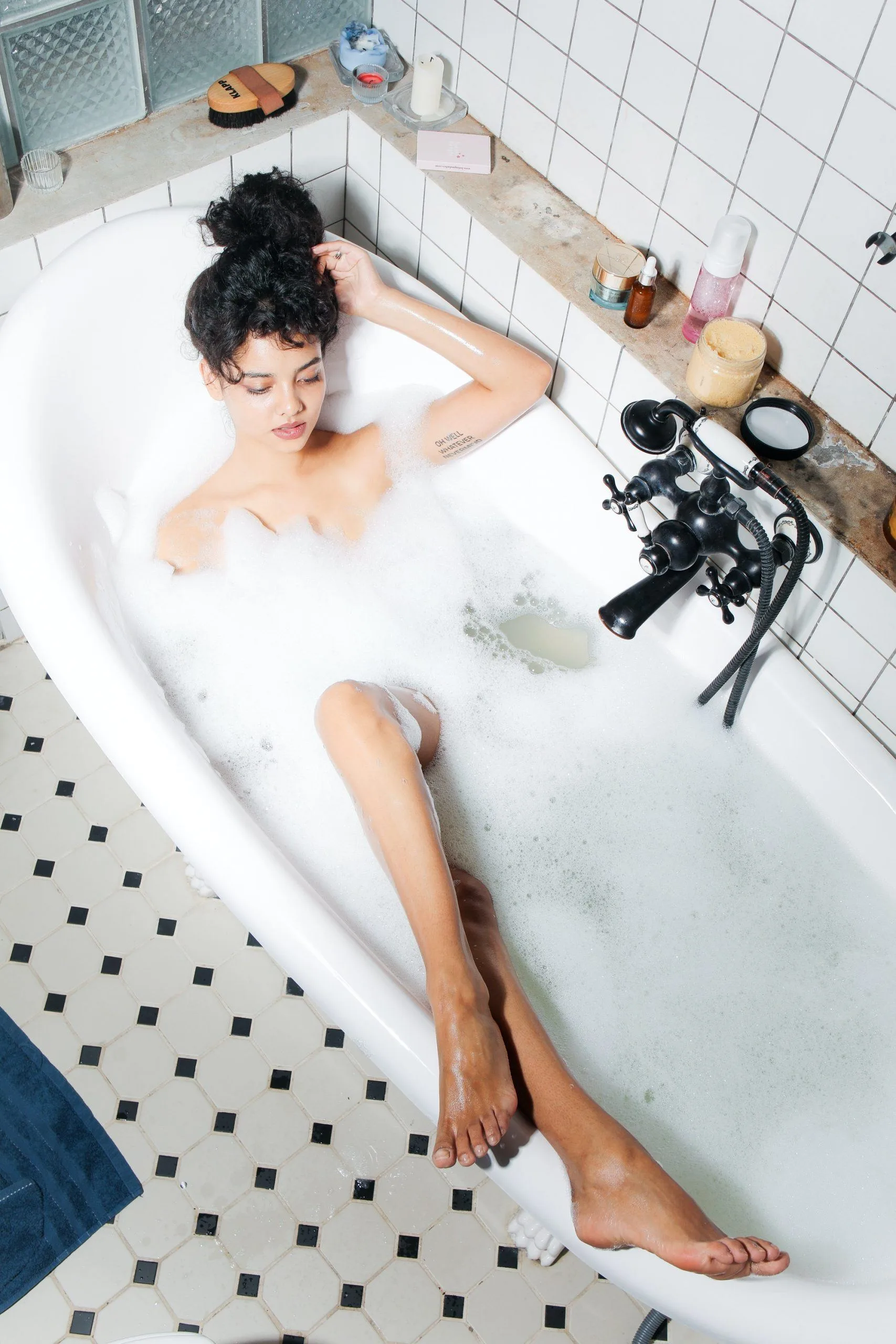When Ashton Kutcher and Mila Kunis came out recently saying that they don’t shower regularly, I have to admit, I shuddered. I definitely wasn’t alone, though. The internet, like my brain, had a lot to say about it. Seemingly, many of us ‘normal’ people disagree. Personally, I am very fond of hygiene. So fond, in fact, that I tend to shower in the morning and then bath at night. I adore the feeling of warm water on my skin.
I’m also quite fond of smelling nice and, you know, just generally keeping up my hygiene. I won’t even get into the hair washing debate here, which is hotly contested. Personally, I have the finest, greasiest hair. So, I wash my hair daily too. I find this whole new ‘trend’ quite disconcerting. And, to be fair, my Twitter and Instagram feed, along with my friend group, was strongly in agreement with me.
The celebs against cleanliness

Mila Kunis via Instagram
I first became aware of this bizarre trend a few weeks ago when Mila Kunis and Ashton Kutcher went viral for their hygiene-related comments. This all came about when they joined Dax Sheppard and Monica Padman on their podcast Armchair Expert. Whilst on the podcast, Kunis and Kutcher mentioned that they don’t often wash, and this goes for their two young kids as well. In fact, grossing out the Internet at large, Kutcher said that they don’t tend to wash their kids unless “you can see the dirt on them”. At the very least, Kutcher does clean his armpits and nether regions daily. This is at least something.
Though cleanliness nuts like myself might like to think that this was a once-off incident, it is, unfortunately, not the case. Kristen Bell is also a ‘fan’ of the anti-bathing movement. She admitted on The View that she and her husband frequently “forget” to bathe their daughters aged six and eight. Bell said in the interview that she is “a big fan of waiting for the stink”. Claiming that the smell is nature’s way of letting you know that it’s time for a wash. Alas, it didn’t end there. If you count the three as a trend, Jake Gyllenhaal cemented this new movement. He told Vanity Fair that he increasingly “find[s] bathing to be less necessary”. And also said that he believes our bodies naturally clean themselves.
A whole new trend?
Though this may seem to have come out of nowhere, the lack of bathing trend for celebs is actually not that new. Brad Pitt admitted years ago that he mostly uses baby wipes to clean his underarms. Robert Pattinson was quite famous for not being a ‘fan’ of washing his hair. Jennifer Aniston thankfully does still take showers. However, she admits to keeping them to three minutes maximum with toothbrushing included. This, at least, is in an effort to save water. I’m not convinced that these other celebs simply can’t be bothered.
does still take showers. However, she admits to keeping them to three minutes maximum with toothbrushing included. This, at least, is in an effort to save water. I’m not convinced that these other celebs simply can’t be bothered.
All of these claims of not wanting to wash away natural oils and ‘damage the skin’ may sound good. But is there any science behind this? Should we all be bathing a little less? Or at least reduce our use of products? According to a Vogue article by Michelle Ruiz, in some cases, celebs might not be as crazy as we think.
How often should we actually be bathing?
When it comes to deciding how much you should be washing, there are vastly different opinions. In fact, even dermatologists don’t agree on how often you should shower. Some claim that you should bathe every other day, and others claim that two or three times a week is enough. As with many other things, how often you bathe or shower should also be based on context. Showering too much in winter, for instance, according to Healthline, could worsen dryness. On the other hand, in Summer, a couple of showers per day may not have any negative effects.
So, is bathing less good for you?
The answer here is mixed. It seems to really be down to a mixture of personal preference and knowing your body. Showering or bathing too often or in water that is too hot can strip the skin of vital oils. If you suffer from skin conditions such as psoriasis or eczema, washing too frequently may even cause flare-ups. It can also cause the loss of bacteria on the skin that is actually good for the body. This could serve to put you at risk of infection.

Photo by Leah Kelley from Pexels
It’s not just good for you, though, it’s also good for the environment. Many of us don’t realize just how much water our daily bath or shower uses. According to the Alliance for Water Efficiency, the average shower lasts around eight minutes. An eight-minute shower uses 17.2 gallons (about 65 liters) of water. Reducing the amount of time you spend in the shower will not only help your body. It will also serve to reduce the water bill and save the planet. All in all, it’s a good idea.
But don’t shower too little either
Much like showering too much isn’t good for you, showering too little is also problematic. Personal hygiene is still important in our society. After all, you don’t want to be the smelly one when we all return to the office. 
Sweat glands cover the majority of the body and throughout the day, as humans, we tend to sweat. The sweat itself doesn’t actually have a smell. It’s only when it mixes with the bacteria on the skin that the smell starts to develop.
Occasionally skipping a shower may not cause you to smell. However, if you’re exercising hard, you should, at the very least, be rinsing off afterward. The longer you go without a shower, the more the odor will build up. This will be particularly prominent in the armpits and groin. But odor isn’t the only concern here. Bad hygiene and not showering often enough can cause a build-up of skin. This can trigger acne and may also cause flare-ups of conditions like psoriasis, dermatitis, and eczema. Not washing frequently can also cause an imbalance of that skin bacteria. This can cause skin infections “where patches of plaque develop on the skin due to inadequate cleansing”. Dead skin cells, when sticking to the skin, cause hyperpigmentation.
Okay, so how should we shower for the best, then?

Photo by cottonbro from Pexels
Honestly, by now, aged 26, I thought I knew how to shower…apparently not though. Having said that, according to Healthline, there are a few steps to follow when you’re going for your shower or bath.
If you exercise frequently, do hard labor, or just have a very dirty or messy job, you should be showering once daily. Ideally, you should only be taking one shower a day. If you feel that you can afford to skip a day in-between, you should. On days when you don’t take a full shower, you should still clean under your arms, your face and your groin area.
Try not to have your shower temperature too high. This can strip the body of its natural oils. Keep your showers as quick as possible. Healthline recommends between 5 and 10 minutes. Avoid aggressively rubbing the skin and use products without fragrance or other irritants. Ideally, your products should be as natural as possible. Lastly, always apply moisturizer after you’ve finished.
References
https://www.healthline.com/health/beauty-skin-care/how-often-should-you-shower#bathing-tips
https://www.vogue.com/article/not-bathing-is-so-hot-right-now-but-is-it-really-better-for-your-skin
https://www.vanityfair.com/style/2021/08/jake-gyllenhaal-prada-luna-rossa-ocean-fragrance



![women [longevity live]](https://longevitylive.com/wp-content/uploads/2020/01/photo-of-women-walking-down-the-street-1116984-100x100.jpg)










